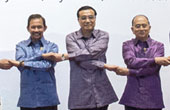Australia out of step with new climate momentum
(Agencies) Updated: 2014-11-28 15:24On the sidelines of the Brisbane summit, Turkish Prime Minister Ahmet Davutoglu said global warming would be a top-agenda item when his country hosts the next G-0 leaders' summit at Antalya in 2015.
"The biggest challenge to all humanity today is climate change," Davutoglu said. Abbott's staff later snubbed Davutoglu's request for a photograph of the two leaders together to represent the presidency of the G20 changing hands.
Abbott said after a recent meeting with French President Francois Hollande that it is "vital" that the Paris climate change conference succeeds. He added, "For it to be a success, we can't pursue environmental improvements at the expense of economic progress. We can't reduce emissions in ways which cost jobs."
Nic Stuart, a columnist for The Canberra Times, wrote this week that because of Abbott's doomed effort to keep climate change off the G20 agenda, "a vital opportunity to jump-start his prime ministership with some international pizazz was squandered."
Abbott's popularity in opinion polling is at a record low for a first-term Australian prime minister. Key planks of his first budget, widely condemned as unfair to the poor, remain stalled in the Senate.
Climate change was the issue that brought Abbott to the helm of his conservative Liberal Party in a leadership ballot of lawmakers by a single vote in 2009. His predecessor, Malcolm Turnbull, was deposed over his plans to support the then-ruling Labor Party's legislation to create an emissions trading scheme.
Abbott is known for saying, also in 2009, that the "climate change argument is absolute crap." He later said the comment was "a little bit of rhetorical hyperbole."
This July, Australia became the only country to toss out an existing carbon-pricing system when Abbott's government repealed a carbon tax levied on the nation's 350 worst industrial greenhouse gas polluters.
Instead, the government has created a 2.55 billion Australian dollar ($2.2 billion) fund of taxpayer money to pay industries incentives to become cleaner. Abbott has ruled out any polluter-pays options for reducing Australia's greenhouse emissions, which on a per-capita basis are among the world's worst.
Abbott's government says its policies can bring the country's carbon gas emissions to 5 percent below 2000 levels by 2020.
Erwin Jackson, deputy chief executive of the Climate Institute independent think-tank, is doubtful. He said he hopes the Australian delegation in Lima agrees to contribute to the Green Climate Fund and proposes a credible plan to reduce Australian emissions post-2020.
"The challenge for them is that they don't have a sustainable or credible climate policy in Australia," Jackson said.
- Xi's Australia visit significant success: expert
- China calls on US, Canada, Australia to jointly combat corruption
- Australia working on new drift modelling for MH370 wreckage
- Australia abuzz over bee threat
- Dim Sum bonds gaining popularity in Australia
- Chinese industries influenced by Sino-Australia FTA
- Australia takes 'sugar off table' to stem asylum tide
- A look inside Bill Gates' 35 million home
- Cats exhibition held in Minsk
- Obama welcomes Xi with nihao at elaborate White House ceremony
- EU and China agree to cooperate on anti-terrorism agenda
- Offices of world leaders
- Mobike touts bike-sharing scheme in LatAm
- 1 killed, 20,000 evacuated by wildfires in Northern California
- Popular Chinese dishes in the US










